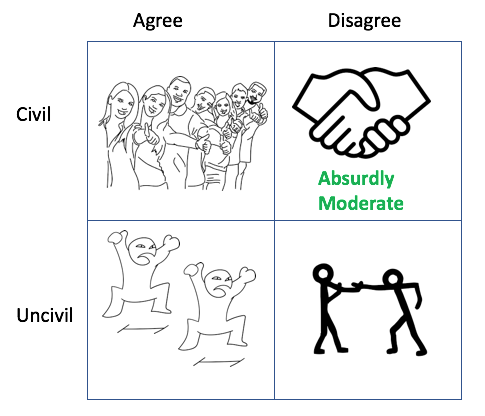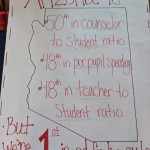My head’s so big you can see it from the moon. Seriously. It barely fits a size 7 3/4 size hat. And now, thanks to reading Angela Buzan’s recent post, Arguing with Sandy Merz, it’s swollen beyond comprehension. And not just because complimentary words from a favorite person can do that, but because she confirms my bedrock belief that dissent, properly deployed, strengthens relationships and amplifies thinking.
These days, unfortunately, one’s allies and adversaries too often view a moderate disposition as a sign of weakness deserving contempt. Just take a peek at David French Proves That War Heroes Make Lousy Social Warriors, in which Milo Yiannopoulos goes after French (my write-in candidate for president in 2016). He condemns French for representing a conservative establishment’s “failure to fight fire with fire and it’s seeming desire to lose gracefully rather than be seen as lacking in manners.” Please read French’s reply, Civility Isn’t Surrender, in full for an extensive analysis of the topic.
(You can find most of what French writes at National Review and he is becoming a common guest on NPR’s Morning Edition. And don’t miss his recent article in the Atlantic, “Why I Carry a Gun.”)
Before going on, let me make three points. First, moderation in disposition is not synonymous with appeasement. Nor does it mean moderation in opinion. Second, holding the views of the far left or the far right doesn’t require extreme expression of those views. Third, no party or ideology has a monopoly on either moderation or outrageousness.
My own absurdly moderate disposition (Angela’s words) grew out of paying attention to William F. Buckley, Jr and Elie Wiesel. I fell into Buckley’s orbit in college watching Firing Line. Buckley, the “Lion of Conservatism” would invite a leading spokesperson for a view he disagreed with and they’d go deep into the issue. The debates were nearly always civil (no one bats 1000%), and I’ve heard that Buckley and his adversary often became personal friends. Late in his life, Terry Gross interviewed Buckley on Fresh Air and asked about his motivations for always inviting such strong opponents to his own views. He answered that he wanted to see his opinions tested by the most challenging opposition to see if they held up. Both his friendliness with adversaries and wish to be challenged seemed like models worth emulating.
Somewhere Elie Wiesel wrote or said that he had more in common with sincere and tolerant Christians, as long as they didn’t try to convert him, than he did Jews who were neither sincere nor tolerant. Consider that for a moment in a political context. Do your politics make you good, or does your goodness make your politics. I firmly believe the latter and am as drawn to political adversaries because of their kindness, humor, and intelligence as I am repelled by allies who might vote the same as I do but repel me on a personal level for their meanness. It doesn’t matter that I think the former mistaken in their opinions and the latter correct.
Beyond Buckley and Wiesel, it’s worth mentioning four short models of dissent, moderation, and disposition that merit consideration.
Computer scientist Wesely A. Clark is credited with designing the first personal computer and considered a grandfather of the internet. He was also my brother-in-law’s father. I asked Brian what his dad contributed, and Brian said he told them they had it backward. Now, I’m not really sure who they were or what they had backward. But, “Maybe I’ve got this backward,” is a pretty good meme to let into your thoughts once in a while.
In World War Z an Oral History of the Zombie War, it’s claimed that the Israelis have a policy that if everyone on a team agrees with a course of action, one member is assigned to prove that it’s the wrong thing to do. I have no idea if that’s true, but ya gotta love taking checks and balances to this extent.
Finally, to keep myself in check, I remember this story I heard in church. A patient in a mental hospital was convinced he was Abe Lincoln. He lamented to his doctor, “But you just don’t get it, I’m right! I really am Abraham Lincoln!” The doctor replied, “Well, do you want to be right or do you want to be well?” The point for me is to know how to disengage with adversaries before going into a rage.
Regrettably, unwell has become a grim but precise description of where we’ve landed. On that, at least, almost everyone agrees. And so everyone must make the decision that Carl Sandburg describes in his short poem Choose.
The single clenched fist is lifted and ready
Or the open asking hand held out and waiting.
Choose:
For we shall meet by one or the other.










Comments 1
I completely agree with this idea. I know many people who have blocked or deleted people who disagree with them on social media. I love having people who think differently on my social media. It keeps me aware of other ideas and political beliefs. When we shut out people with different beliefs, we will really become divisive. I have always wished that every law should have the majority of votes and at least one person from the other side to vote yes.